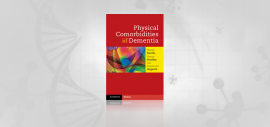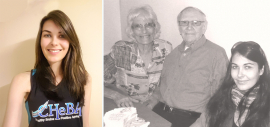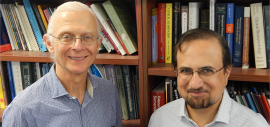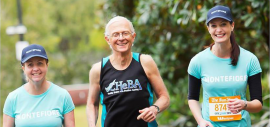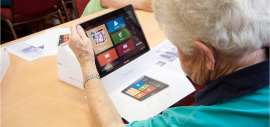Blog: The Brain Dialogues, filtered by tag: Professor Henry Brodaty AO
Suicide and Middle Aged Men
HEIDI DOUGLASS | h.douglass@unsw.edu.au
Since the devastating death of respected American comedian Robin Williams nearly three weeks ago, the internet has been rife with speculation on the underlying factors behind this tragedy. Respectfully, this conjecture should be left as a matter for his family and physicians, but what the rest of us can do to honour this remarkable personality who warmed the hearts of many generations is strive to increase awareness and understanding of clinical depression and its significant relationship to brain diseases and ageing.
In a recent interview with SBS… Read More
Book Review: Physical Comorbidities of Dementia
PROFESSOR DAVID AMES
A geriatrician, a psychiatrist and a nurse (no this isn't the start of a joke!) have written a useful review outlining what is known about nine medical conditions that occur more often in people with dementia (PWD) than in other people. These syndromes are falls, delirium, epilepsy, weight loss and nutritional disorders, incontinence, sleep disturbance, visual dysfunction, oral disease and frailty.
After an introductory chapter, nine further chapters outline published evidence about dementia and these nine co-morbidities. The writing is clear and concise and, as the… Read More
Exercising the Mind
STEPHANIE CAMPBELL, CHeBA CHAMPION (FITNESS AMBASSADOR FOR CHeBA)
I’m jogging up a ridiculously steep street in Sydney’s leafy, bayside suburb of Mosman. My knees ache, my quads are burning, and my lungs hurt from straining for air. No point pretending – I hate uphill. Forehead glistening with sweat, I grit my teeth and finally reach the crest, attempting to breathe through a massive stitch in my side as I take the pace back down to a steady walk to recover. The oversized Garmin fitness watch strapped to my left wrist bleeps encouragingly at me to signal I’ve covered another kilometre, and… Read More
CHeBA Turns One - Our Mission
PROFESSOR PERMINDER SACHDEV and PROFESSOR HENRY BRODATY, CO-DIRECTORS, CHeBA
There is a worldwide effort to identify risk and protective factors, establish biomarkers and develop novel treatments for mild cognitive impairment (MCI), dementia and geriatric depression.
Over the last decade, our group has been a leading contributor to this effort. We established five longitudinal studies of cognitive ageing and dementia along multiple lines of investigation which include neuroepidemiology, neuropsychology, neuroimaging, genetics/genomics, proteomics, stem cells, metabolomics and… Read More
Donating Your Brain to Research
HEIDI DOUGLASS | h.douglass@unsw.edu.au
There are currently approximately 320,000 people in Australia with dementia, with that number set to rise to almost one million by 2050, and 115 million globally. These predictions mean that not only do we need a clear plan to make care available for so many people with dementia, but we also need to pursue prevention strategies vigorously.
Prevention of dementia depends largely upon research, and beyond the necessities of funding, equipment, and academics with the right skill base to perform the research we need one extra thing: brains.
"Even before… Read More
Ageing Well - Living Healthier
PROFESSOR HENRY BRODATY, MD, PhD
Prevention
We all become slower and more forgetful as we age, some of us more than others. When this change is accelerated and interferes with a variety of thinking or cognitive abilities and interferes with our day to day functioning, this is diagnosed as dementia, of which the most common type is Alzheimer’s disease.
Surveys of the population indicate that dementia in general and Alzheimer’s in particular, along with cancer, are the health problems that we generally fear most. Rightly so! As we are living longer the chances of developing a dementia… Read More
Running for Healthy Brain Ageing
PROFESSOR HENRY BRODATY, MD, PhD
This article was originally published in the August edition of Montefiore LIFE Magazine.
When I first started working as a doctor in 1970, Alzheimer's disease was thought of as a rare disease only affecting people under the age of 65 years. No-one was much interested in older people with brain disease or mental illness and they were all lumped together under a diagnosis of senile psychosis or senile dementia. Hasn't the world changed! No-one had heard of Alzheimer's disease 40 years ago. Now it is a household word and what people fear most (along with… Read More
Staying Connected Online is a No Brainer
HEIDI DOUGLASS | h.douglass@unsw.edu.au
This article was originally published in Simply Connected on the Tapestry website.
Can staying connected with your friends online keep your brain young?
Research indicates that social activity, in combination with a healthy lifestyle and brain training, actually restores and improves brain function.
In many countries we are ageing at an astonishing rate. For example, in the US, the number of individuals aged 90 years and over is predicted to increase from the current 2 million to more than 8 million by 2050.
Centenarians (those that attain the age… Read More
10 Year Strategy for Public Health in Australia
PROFESSOR HENRY BRODATY, MD, PhD
On the 5th of April 2013, Minister Plibersek released the eagerly awaited final report of the McKeon Strategic Review of Health and Medical Research Australia (http://www.mckeonreview.org.au/). The Review presents 21 recommendations for improving health and medical research (HMR) in Australia over the next decade. The 304 page detailed full report presents a strong economic and health improvement case for enhancement; it abounds in fascinating statistics, case studies and insightful exhibits. Time challenged readers can refer to the separate 64 page summary… Read More
Let's Rethink the Meaning of Ageing
HEIDI DOUGLASS | h.douglass@unsw.edu.au
Historically, none of us have particularly looked forward to growing 'old'. If you ask a wide demographic to define the word 'ageing', a range of pessimistic viewpoints will filter in, such as loss of independence, burden to others, physical incapability, loneliness, hip replacements, dementia and loss of dignity. It seems that, for many people, the path to ageing appears to be a steep decline into misery.
A predominant reason for this is that age catches us by surprise. We're unprepared. We've been happily going about our business of day to day life… Read More

